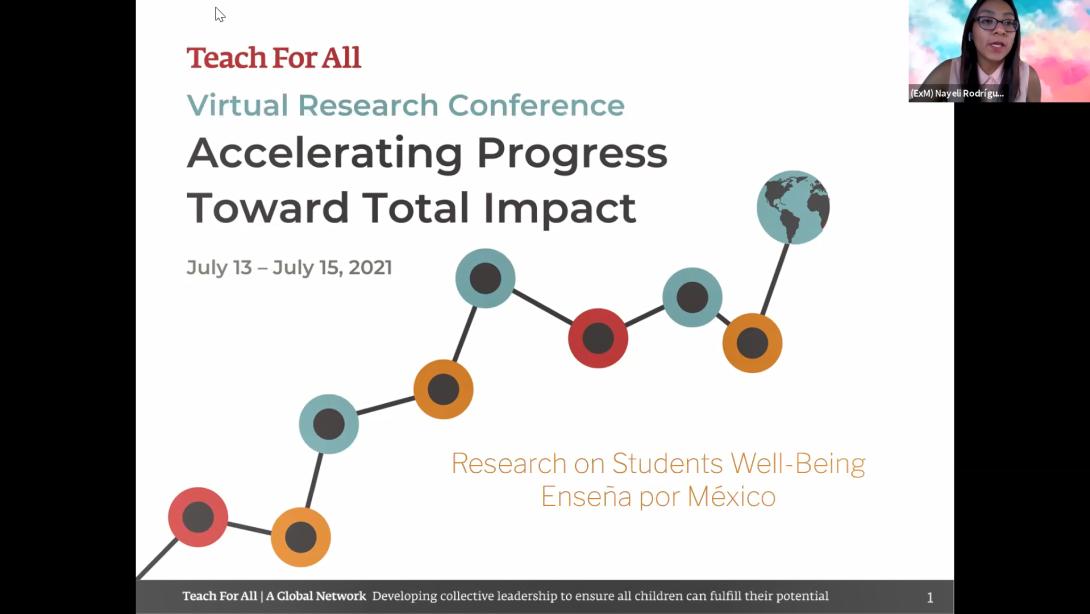Virtual Research Conference: A Space to Connect

The 2021 Virtual Research Conference was Teach For All's first annual convening to discuss the network’s latest developments in research, inviting more than 270 network partner staff, alumni, and external researchers. This event brought together partners to learn from exciting innovations in research methods, learn about key findings, and engage in dialogue with peer organizations and expert researchers. Over the course of this three-day conference, attendees embarked on a virtual journey across the Teach For All network to understand the role research and evidence can play in demonstrating and accelerating progress toward total impact. Nayeli Rodriguez, Research Manager at Enseña por México, reflects on her journey at the conference as a speaker and attendee below. To read a Spanish version, click here.
From July 13-15, Teach For All’s first Virtual Research Conference brought together researchers and experts from within and beyond our network to share educational innovations and research projects focused on leadership, discuss the impact of these innovations on students and communities, and provide an opportunity to create spaces for connection and the exchange of ideas among the participants.
In addition to being an attendee at the conference I had the opportunity to participate as a speaker, and share the progress we've made at Enseña por México with the development of reliable and scientifically rigorous surveys to measure socio-emotional skills. The session opened the door for us to ask ourselves new questions, to identify how we can improve our research protocols, and to learn from others’ perspectives what else we should consider when it comes to the development of socio-emotional skills. Measurement and evaluation processes not only involve concrete figures and data but also relate to how we understand and learn from the diversity of the contexts we are collaborating in.
On a personal level, I get really excited at this type of forum. For me, it's an opportunity to learn how others are working in different parts of the world, expand my knowledge on certain topics, and connect with people who have professional interests similar to mine. This time, beyond the learning experience I had about my own work, I was inspired by the conversations I had in the networking rooms, where I understood more deeply that, despite the diversity of our contexts, the challenges partners face across the network are quite similar.
Although the conference was an event focused on research, measurement, and evaluation, I was amazed to discover that colleagues whose work focuses on other areas are also interested in exploring these topics. Regardless of the differences in our roles within the network, we have the same values and interest in educaction.
Something I reflected on at the end of the conference is that we, the Monitoring, Evaluation and Learning community, have to speak out about and do more to socialize the efforts and projects we're working on with the rest of the network. Promoting a culture of evidence-based decision making will enable us to work in a more coordinated way, and to gain a common understanding of many aspects of our work, such as:
- When they happen, our errors, low numbers, or unexpected results are not failures, but opportunities to learn
- We are not just generating data and research protocols, these numbers represent students, teachers, caregivers, and staff
- Evaluation processes are complicated and time-consuming, but they are also necessary to sustain our practice and generate evidence.
I hope that in future years more people will join Teach For All’s annual Research Conference, which enriches our roles and allows us to connect and reconnect with peers who are motivated and enthusiastic about generating effective learning environments for our students.



